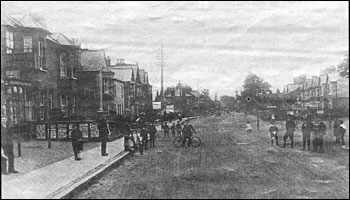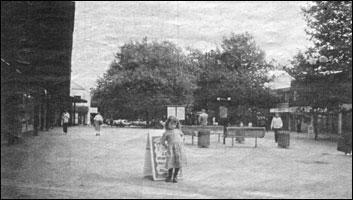![]()
The contents on this page remain on our website for informational purposes only.
Content on this page will not be reviewed or updated.
 |
|
 |
|
|
||||
|
Bletchley Road, Then & Now
|
||||
|
||||
|
Sunday Citizen June 18, 2000
In these then and now photographs, little remains recognisable after the passage of 82 years. Bletchley Road, now Queensway, stretches away towards Fenny Stratford and while new housing has become apparent, previous to this only the Halfway House interrupted the rural isolation that separated Bletchley and Fenny Stratford. The state of the road leaves much to be desired and becomes 'a genuine muddy slough of despond' in winter and 'as dusty as the Sahara' in summer. On the left a footpath provides pedestrian access and along its course stand the poles for the telephone service, introduced at the turn of the century. In the coming winter a heavy fall of snow brings down all but two of these poles and the Royal Engineers, stationed at Staple Hall, are detailed to effect temporary repairs. These temporary efforts then suffice until the end of the year, when work begins on providing an underground cable. When the telephone service was introduced to the town the council had wanted the poles to be erected on the other side of the road, so as not to obstruct the footpath. The Post Office, however, insisted on erecting them on the other side, for the reason that this side was already built up and installing connections would therefore be easier. As the council curtly pointed out, while it may well have been built up the occupants 'then, and could not ever, require or think of having telephone connections'. The 'occupants', in fact/had only the local choice of using the public call box at Fenny Stratford, although within a few months another call box would be installed at the Bletchley post office, the council having agreed that if the yearly revenue proved insufficient, then they would make up the difference to the Post Office authorities. |
||||
|
|
||||
|
|
||||


